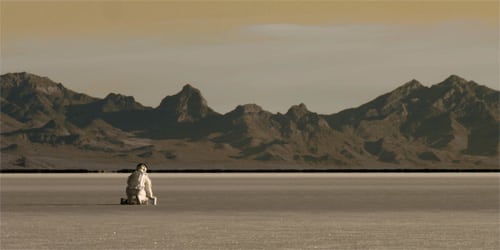Magellan (2017)
Directed by: Rob York
Written by: Rob York, Scott Baird
Starring: Brandon Ray Olive, K. Danor Gerald, Whitney Palmer

Magellan (USA, English, 103 mins)
SCI-FI LONDON FILM FESTIVAL 2017 runs from 27 April – 6 May https://sci-fi-london.com/
I’ve always had a soft spot for shoe string budget releases where the core ideas are put ahead of the vistas and visual effects, whether it’s Moon or Dark Star. Results may vary but you can always tell when there was a certain amount of creative energy involved, a kind of flair which often points to the passion of the film makers. However in some instances it’s more apparent that the ideas are second hand, and I’m saddened to say this is the case with Magellan, a story which is too happy to borrow elements from elsewhere without either adding new ingredients of its own, or assembling all those old staples in a satisfying manner. It poses a lot of big questions, but doesn’t spend any time developing worthwhile answers.

A lot of old ground is covered in the opening narration, which goes over the standard themes of humanity being alone in the universe. A launch into the outer reaches of our solar system is about to take place to find answers to this question. It looks very flimsy and the only instance of zero gravity effects being used is brief for good reason. The astronaut keeps calling the mission commander ‘NASA’, and the ship interiors are filmed in a plain white room which is starkly contrasted against some solid CGI exteriors showing the Earth and the spacecraft. I’m willing to let these kind of things slide if they keep it interesting. However as they jump back two and a half years to provide some exposition it’s apparent that this is going to be unlikely.
Commander Nelson (Brandon Ray Olive) is offered a unique opportunity, to investigate a series of artificial signals being broadcast from three different points in space. Research by SETI has pinpointed the nature and position of this phenomenon, on a moon of Saturn, a moon of Neptune, and finally the dwarf planet Eris. Of course he jumps at the opportunity to explore the unknown, without stopping to ask why this is a solo mission without any supporting crew members or how they plan to reach these destinations in just 5 years travel time, a surprisingly brisk 10 year mission in total.
The main issue here (beyond the technology making this travel speed possible being glossed over) is that he is alone for the journey. It seems unpractical, but the bigger problem is that there are no other characters to develop and no ego clashes or human conflicts along the way. He has an on-board computer for company, but even this lacks charisma. Ferdinand and Neil, the A.I. voices he interacts with along the way with are surprisingly uninteresting. One character facing the odds alone has been done well in the past of course, but here it’s very underwhelming. The main cause of concern is his wife Abigail (Whitney Palmer) who chimes in to provide some obligatory domestic melodrama every so often. But even this fails to develop into anything with real weight and Nelson doesn’t seem that interested in her concerns. In fact the whole mission feels almost too simple at times.

When things eventually get moving he travels to each destination planet with relative ease, with a few months of hibernation in between. There isn’t much of a strain on the mission or his psyche; maybe he just has the right stuff. The kind of things he discovers at each location are pretty easy to overcome as well, whether it’s lakes of methane, extreme weather fronts, or difficult gravity situations. The ticking clock element – reaching each target on a timer because of their orbit – is never really a major issue. There are no dramatic sacrifices or difficult decisions because he is alone. They do come into contact with the source of the strange radio signals eventually adding a new mystery element, but beyond this it’s never particularly engrossing. A little classic space madness would have gone a long way.
Even Nelson’s own bad scientific practices don’t cause any really disturbing problems, and he’s free to disregard protocol and make silly choices. Instead there’s an attempt to provide some kind of villain, with mentions every so often of a rival Chinese space agency launching their own craft or hacking the mission control computers. Perhaps if this was actually set up as a race against them it could work, but it feels like a story element that could be lost without any major differences. Besides, there’s no need to be topical in this kind of story which is supposed to be about the human race as a whole. The dramatic elements fall flat, and the endless scenes of video logs soon become repetitive and redundant, making this all feel small and tedious instead of grand and cosmic.
There are some moments where things feel a lot more effective. Some of the alien landscapes are made from part digital and part real world locations, adding a decent amount of aesthetic variety. The ideas and plot developments are never too outlandish. But it feels dry and weightless, lacking the gravitas of the films which it takes influence from. It doesn’t build on the elements taken from other sources, and never tries to understand them. Interstellar was already derivative, but this borrows visual and musical cues without trying to develop any of those elements further as a unique story. They should have stepped back and strengthened the human elements, instead of over reaching and shooting for targets well outside their potential trajectory.
Rating: 











Not being interested in over analyzing the movie (I’m not paid to do that), I found it entertaining and very worth the time I spent watching it. So much so, that I am hopeful there will be a sequel. Yes, there were some scientific flaws, but they did not, for me at least, detract from a very entertaining story.